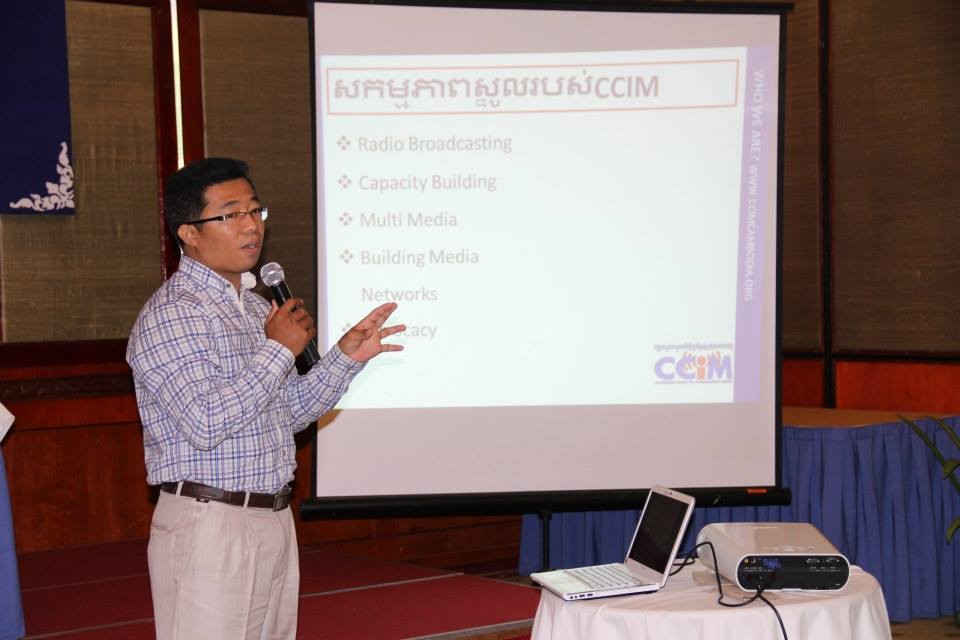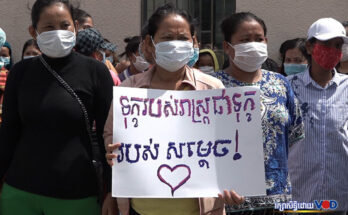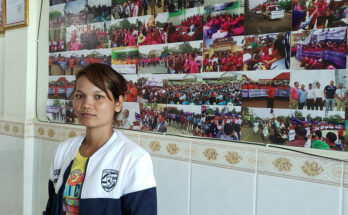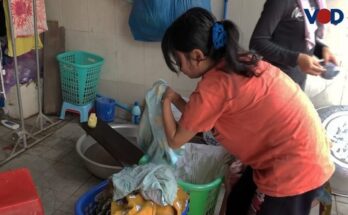Monday June 24, 2013, a conference was held by the Cambodian Center for Independent Media (CCIM) to “Voice the requests of citizens ahead of the National Assembly Elections”, in Phnom Penh. The conference was attended by political party representatives, the public and the media.
During the event, CCIM presented the findings and recommendations following two investigative reports and four community forums conducted by the organization into Cambodia’s election and voting processes. This was followed by an open debate and Q&A session around the reports and recommendations, where the public could ask questions to a panel of politicians and party representatives. While the panel did not include a representative from the current party in power, the Cambodian People’s Party, nor the FUNCINPEC party, it did include representatives from 8 different political parties. A representative from the National Election Committee (NEC), Dr. Keo Phalla, reminded the audience about the importance of voting in his remark and suggested that while it is not an obligation to vote in Cambodia, it is a right, which should be exercised by everyone. 
The investigative reports brought to light several key issues surrounding the election process in Cambodia. The investigations were conducted after CCIM organized 4 forums in 4 provinces throughout Cambodia in May and June 2013, which encouraged the public to raise their concerns on political issues in Cambodia, as well as be informed on their human and constitutional rights.
The first investigation examined the drastic drop in voting numbers in the last 20 years, which have plummeted from 89.56% participation rate in the first election in 1993, to 75.08% in the last election in 2008. It attributes this to the difficulty of having a valid ID card to use for voting, misinformation about the process for voting registration, and those who have immigrated cannot afford to travel home to vote. All three of these processes have been changed within the last 20 years, with little communication to help the people of Cambodia know how to properly vote and have their voice heard during elections.
The second investigation shows the difficulty in ensuring a fair and just election. The unbalanced nature of the media around certain political parties and their campaign coverage, public servants involvement in campaigning, and a lack of enforcement of laws pertaining to election campaigns were all raised as significantly stunting the potential of a truly free election in Cambodia.
Recommendations from the forums included a call to NGOs to monitor the voting process to reduce corruption and ensure any laws around campaigns are enforced by the correct authorities. CCIM also recommended reestablishing voting ID cards to all citizens to ensure the public all have the ability to identify themselves and vote in elections. CCIM also made a call to the NEC to help make the public’s concerns heard by presenting them to the government, and to fight for the people of Cambodia’s rights to free elections and open media.
 With political debates a rarity in Cambodia, the Q&A session was a lively discussion that allowed the public to ask questions in regards to the report presented by CCIM. The panel included representatives from; Cambodia National Rescue Party, the League for Democracy Party, The Cambodia National Party, The Khmer Anti-Poverty Party, the Khmer Economic Development Party and the Republican Democracy Party. Many of the questions were tough and called on the panel to discuss openly their plans to help make some important changes to the election process in Cambodia. The topic of corruption and unfair media distribution was a prominent one, with questions being asked on with the CPP could campaign for more than the legal 30 days prior to an election, without legal retribution.
With political debates a rarity in Cambodia, the Q&A session was a lively discussion that allowed the public to ask questions in regards to the report presented by CCIM. The panel included representatives from; Cambodia National Rescue Party, the League for Democracy Party, The Cambodia National Party, The Khmer Anti-Poverty Party, the Khmer Economic Development Party and the Republican Democracy Party. Many of the questions were tough and called on the panel to discuss openly their plans to help make some important changes to the election process in Cambodia. The topic of corruption and unfair media distribution was a prominent one, with questions being asked on with the CPP could campaign for more than the legal 30 days prior to an election, without legal retribution.
Feedback on the conference from the public was positive, with attendants agreeing on the importance of such initiatives. According to a survey distributed after the conference, participants felt that the conference helped them understand the policies of each party, as well as the response from the NEC, the importance of democracy and justice and gain further information about laws pertaining to political procedures, amendments and freedom of expression.
The conference, particularly the debate, was an important step in the right direction for Cambodian politics, and for the public to be more informed, more involved and better represented in government processes.
The reports in Khmer will be available on Sarika FM in Phnom Penh (106.5 FM) and Siem Reap (95 FM) from 27th June 2013.




